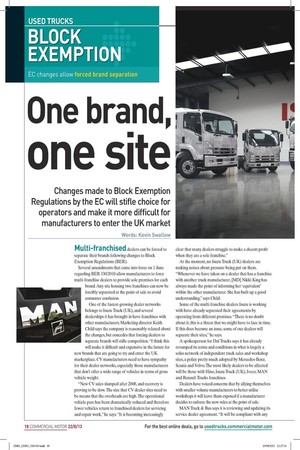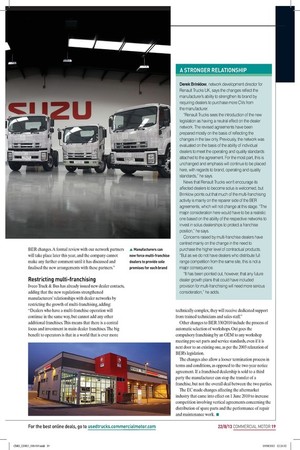One brand,
Page 13

Page 14

If you've noticed an error in this article please click here to report it so we can fix it.
one site
Changes made to Block Exemption Regulations by the EC will stifle choice for operators and make it more difficult for manufacturers to enter the UK market
Multi-franchised dealers can be forced to separate their brands following changes to Block Exemption Regulations (BER).
Several amendments that came into force on 1 June regarding BER 330/2010 allow manufacturers to force multi-franchise dealers to provide sole premises for each brand. Any site housing two franchises can now be forcibly separated at the point of sale to avoid consumer confusion.
Several amendments that came into force on 1 June regarding BER 330/2010 allow manufacturers to force multi-franchise dealers to provide sole premises for each brand. Any site housing two franchises can now be forcibly separated at the point of sale to avoid consumer confusion.
One of the fastest-growing dealer networks belongs to Isuzu Truck (UK), and several dealerships it has brought in have franchises with other manufacturers. Marketing director Keith Child says the company is reasonably relaxed about the changes, but concedes that forcing dealers to separate brands will stifle competition. "I think this will make it difficult and expensive in the future for new brands that are going to try and enter the UK marketplace. CV manufacturers need to have sympathy for their dealer networks, especially those manufacturers that don't offer a wide range of vehicles in terms of gross vehicle weight.
One of the fastest-growing dealer networks belongs to Isuzu Truck (UK), and several dealerships it has brought in have franchises with other manufacturers. Marketing director Keith Child says the company is reasonably relaxed about the changes, but concedes that forcing dealers to separate brands will stifle competition. "I think this will make it difficult and expensive in the future for new brands that are going to try and enter the UK marketplace. CV manufacturers need to have sympathy for their dealer networks, especially those manufacturers that don't offer a wide range of vehicles in terms of gross vehicle weight. "New CV sales slumped after 2008, and recovery is proving to be slow. The size that CV dealer sites need to be means that the overheads are high. The operational vehicle parc has been dramatically reduced and therefore fewer vehicles return to franchised dealers for servicing and repair work," he says. "It is becoming increasingly
clear that many dealers struggle to make a decent profit when they are a sole franchise."
At the moment, no Isuzu Truck (UK) dealers are making noises about pressure being put on them. "Whenever we have taken on a dealer that has a franchise with another truck manufacturer, [MD] Nikki King has always made the point of informing her 'equivalent' within the other manufacturer. She has built up a good understanding," says Child.
Some of the multi-franchise dealers Isuzu is working with have already separated their agreements by operating from different premises. "There is no doubt about it; this is a threat that we might have to face in time. If this does become an issue, some of our dealers will separate their sites," he says.
A spokesperson for Daf Trucks says it has already revamped its terms and conditions in what is largely a solus network of independent truck sales and workshop sites, a policy pretty much adopted by Mercedes-Benz, Scania and Volvo. The most likely dealers to be affected will be those with Hino, Isuzu Truck (UK), Iveco, MAN and Renault Trucks franchises.
Dealers have voiced concerns that by allying themselves with smaller volume manufacturers to better utilise workshops it will leave them exposed if a manufacturer decides to enforce the new rules at the point of sale. MAN Truck & Bus says it is reviewing and updating its service dealer agreement. "It will be compliant with any
BER changes. A formal review with our network partners will take place later this year, and the company cannot make any further comment until it has discussed and finalised the new arrangements with these partners."
Restricting multi-franchising
Iveco Truck & Bus has already issued new dealer contacts, adding that the new regulations strengthened manufacturers' relationships with dealer networks by restricting the growth of multi-franchising, adding: "Dealers who have a multi-franchise operation will continue in the same way, but cannot add any other additional franchises. This means that there is a central focus and investment in main dealer franchises. The big benefit to operators is that in a world that is ever more
technically complex, they will receive dedicated support from trained technicians and sales staff."
Other changes to BER 330/2010 include the process of automatic selection of workshops. Out goes the compulsory franchising by an OEM to any workshop meeting pre-set parts and service standards, even if it is next door to an existing one, as per the 2003 relaxation of BERs legislation.
The changes also allow a looser termination process in terms and conditions, as opposed to the two-year notice agreement. If a franchised dealership is sold to a third party the manufacturer can stop the transfer of a franchise, but not the overall deal between the two parties. The EC made changes affecting the aftermarket industry that came into effect on 1 June 2010 to increase competition involving vertical agreements concerning the distribution of spare parts and the performance of repair and maintenance work. •









































